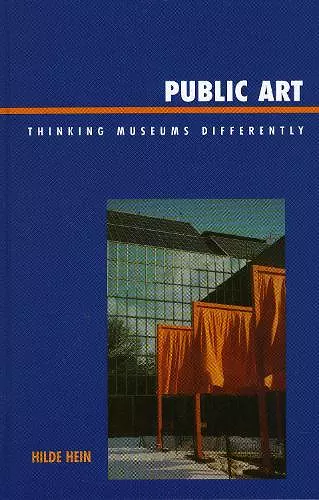Public Art
Thinking Museums Differently
Format:Hardback
Publisher:AltaMira Press
Published:27th Jul '06
Currently unavailable, and unfortunately no date known when it will be back
This hardback is available in another edition too:
- Paperback£41.00(9780759109599)

Public Art acknowledges the trend among contemporary museums to promote participatory and processual exhibition strategies meant to elicit subjective experience. At the same time it valorizes the object-oriented tradition that has long differentiated museums from other institutions similarly committed to public service and the perpetuation of cultural values. To blend and expand these aims, Hein draws upon a movement toward ephemerality and impermanence in public art. She proposes a new dynamic for the museum that is temporal and pluralistic, while retaining a grounding in material things. The museum is an agent, not a repository; and like public art, it interacts constructively with passing and transitory publics. As an actor with social clout, the museum has moral impact and responsibilities beyond those of the individuals that comprise its collective identity. The book should be read by museum workers and students, by arts and foundation administrators, critics, educators, aestheticians, institutional historians and theorists, and by anyone interested in the transmission of cultural concepts and values.
In this wide-ranging study, Hilde Hein looks to the history of public art in order to propose a more dynamic future for the museum. She reveals the ways in which public art's emphasis on experience, process, and the ephemeral provides a deeper understanding of the changes—if not the paradigm shift—already underway in museums. -- Chon A. Noriega, Professor, UCLA Department of Film, Television, and Digital Media
Hein's exploration of the museum world emphasizes experience and qualifies art as a process, not a thing, hence her concept of the museum as a performance in which objects and people participate. Six chapters discuss The Experiential Museum, Private, Nonprivate, and the Public, History and Meaning of Public Art, Innovation in Public Art, Old Museums and a New Paradigm, and Why a New Paradigm. Although her exposition is soundly based in philosophical arguments, Hein illuminates the discourse with examples like Christo's Gates project and the Baltimore Museum of Visionary Art. The reader finds discussions of contemporary developments like virtual visitors, the uses of electronic technology to extend the accessibility of collections beyondfixed walls. Motivated citizens can freely rearrange their downloaded treasure to create 'collections' of their own design. Nor does Hein (emer., College of the Holy Cross) neglect the significance of the museum site in its effect on the response to collections. Her writing is frequently poetic, as when she explains that objects can inspire the museal gaze which ignites the sense of presence. By emphasizing the impermanence of objects, she helps the reader focus on qualities of museums rarely consider * CHOICE *
This eloquent book proposes a new paradigm for the museum, based on a deeply informed understanding of public art and museum practice. By comparing the museum to contemporary public art, Hilde Hein shows how the dynamic experimentalism of the latter can replace the static notion of museums as containers for timeless art. That is an invaluable lesson. -- Hafpór Yngvason, Director, Reykjavik Art Museum
Hein's exploration of the museum world emphasizes experience and qualifies art as "a process, not a thing," hence her concept of "the museum as a performance in which objects and people participate." Six chapters discuss "The Experiential Museum," "Private, Nonprivate, and the Public," "History and Meaning of Public Art," "Innovation in Public Art," "Old Museums and a New Paradigm," and "Why a New Paradigm." Although her exposition is soundly based in philosophical arguments, Hein illuminates the discourse with examples like Christo's Gates project and the Baltimore Museum of Visionary Art. The reader finds discussions of contemporary developments like "virtual visitors," the uses of electronic technology to extend the accessibility of collections beyond fixed walls. Motivated citizens can "freely rearrange their downloaded treasure to create 'collections' of their own design." Nor does Hein (emer., College of the Holy Cross) neglect the significance of the museum site in its effect on the response to collections. Her writing is frequently poetic, as when she explains that objects can "inspire the museal gaze which ignites the sense of presence." By emphasizing the impermanence of objects, she helps the reader focus on qualities of museums rarely considered elsewhere. * CHOICE *
ISBN: 9780759109582
Dimensions: 240mm x 161mm x 17mm
Weight: 442g
198 pages